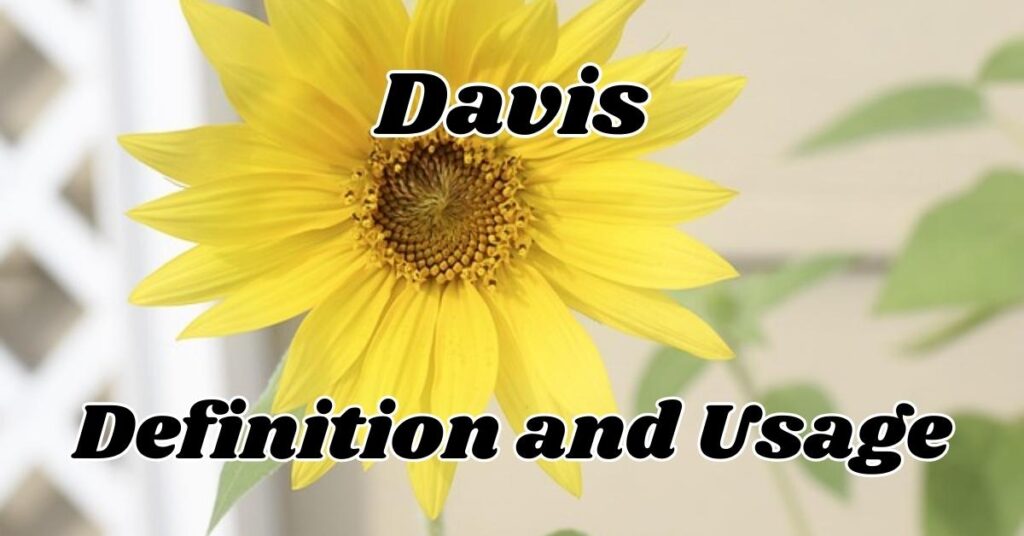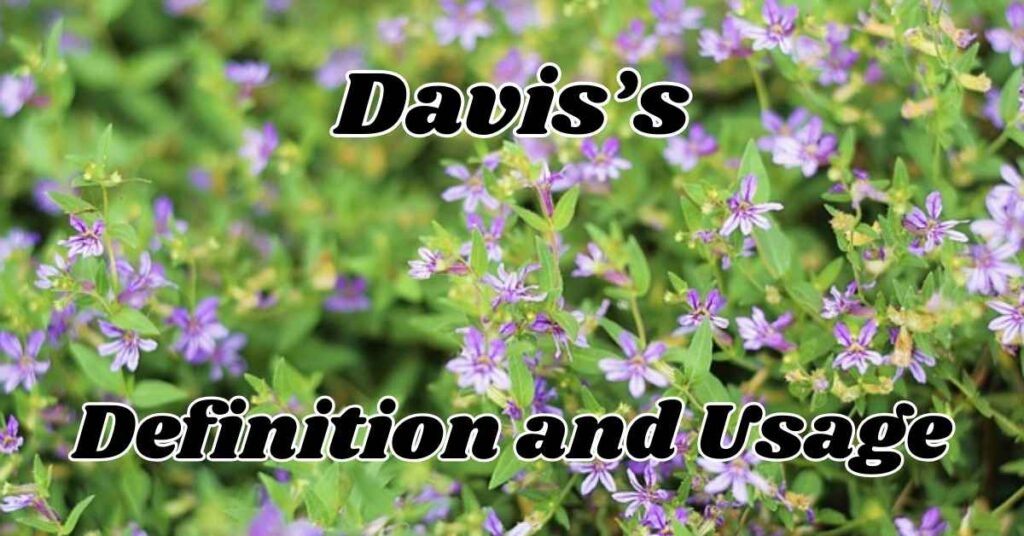Plural of Davis and its possessive forms often trip up even seasoned writers. Is it Davis’ vs Davis’s? This comprehensive guide demystifies the rules governing the plural of a name like Davis, providing clear explanations and examples.
We’ll delve into the intricacies of English grammar, exploring the difference between pluralization and possession. Understanding these distinctions is crucial for correctly using not just Davis, but other proper nouns as well.
This article will cover everything from the plural form (Davises) to the singular possessive form (Davis’s), addressing common misconceptions and offering practical tips.
Quick Summary
The question of “Davis’ vs Davis’s?” boils down to understanding the difference between plural and possessive forms. The plural of Davis is Davises, while the singular possessive can be either Davis’ and Davis’s, though Davis’s is generally preferred.
Davis’ (or Davis’s) indicates possession (e.g., Davis’s car), whereas Davises refers to multiple people named Davis (e.g., The Davises are a lovely family). Mastering this distinction clarifies the correct usage in various contexts.
Understanding Davis’ or Davis’s

The heart of the issue lies in the distinction between pluralizing a proper noun and indicating possession. While both forms involve an apostrophe and an “s,” they serve different grammatical functions.
Understanding this difference is key to mastering the plural Davis. It’s important to note that while the plural Davis is Davises, the singular possessive can be either Davis’ and Davis’s, with Davis’s being the more common and generally preferred form.
Plural of Davis
The plural of Davis is straightforward: Davises. Just like other names ending in “s,” we add “es” to form the plural. Think of it like the plural of “Jones,” which becomes “Joneses.”
This rule applies to all proper nouns ending in “s,” “z,” “x,” “ch,” or “sh.” So, when referring to more than one person named Davis, you would say “the Davises.”
Davis as a Singular Noun in Example Sentences:
- I know a man named Davis.
- Davis is a talented musician.
- Have you met Davis from accounting?
- Davis always has a smile on his face.
- My friend Davis is a great cook.
- Davis is a common surname.
- The report was written by Davis.
- Davis will be presenting at the conference.
- I received a call from Davis this morning.
- Davis is a well-respected member of the community.
Davis as a Plural Noun in Example Sentences:
- The Davises are hosting a barbecue.
- I’m going to the Davises’ house for dinner.
- The Davises are a lovely family.
- We met the Davises at the party.
- The Davises have lived here for many years.
- All the Davises were invited to the family reunion.
- The Davises’ mansion is quite impressive.
- I admire the Davises’ philanthropic efforts.
- The Davises are known for their hospitality.
- The Davises’ family history is fascinating.
Origins of the Davis
The surname Davis has roots in both Wales and England. It’s primarily a patronymic surname, meaning “son of David,” derived from the given name Dafydd (Welsh) or David (English). In Wales, it may also be linked to the surname Dyfed.
Popular in Wales before England and Scotland, Davis later spread, becoming a common name adopted by various groups, including some Jewish communities in English-speaking regions. Notable figures like Jefferson Davis and David ap Gryffydd have carried this surname.
Davis: Definition and Usage

“Davis” primarily functions as a surname, a hereditary name passed down through families. It’s classified as a proper noun, distinguishing a specific individual or family.
While most commonly used as a last name, “Davis” can occasionally be a first name, though this is less frequent. Its usage is widespread across English-speaking countries and beyond, appearing in official records, everyday conversations, and genealogical research.
Understanding its role as a proper noun is key to correctly applying grammatical rules, especially concerning pluralization and possession.
Davis Meanings
The surname “Davis” originates from the given name “David,” which carries the meaning of “beloved.” While “Davis” itself doesn’t have a direct, independent meaning beyond being a surname, it inherits this connotation of “beloved” through its etymological link to “David.”
This association adds a subtle layer of meaning, even though the primary function of “Davis” is simply to identify a person within a family lineage.
Davis Usage
“Davis” is predominantly used as a surname, identifying individuals within a family context. You’ll encounter it in various settings, from formal documents like birth certificates and marriage licenses to informal conversations and social media profiles.
It’s a common name, appearing frequently in phone books, address lists, and other compilations of personal information. Understanding its proper noun status is essential for correctly applying grammatical rules related to pluralization and possession, as outlined elsewhere in this guide.
Synonyms of Davis
While Davis is a specific name, you might use other common surnames in its place when discussing general concepts related to families or individuals. However, there aren’t direct synonyms for a proper noun.
- Smith
- Johnson
- Williams
- Brown
- Jones
- Garcia
- Miller
- Anderson
- Taylor
- Thomas
Davis Example
Consider this sentence: “Davis is a talented musician.” Here, “Davis” functions as a singular noun, specifically a surname, identifying an individual. It could also be a first name, though less common.
This usage is straightforward and typical of how surnames are employed in everyday language. “Davis” serves to distinguish this person from others and may carry familial or historical connections.
Understanding its role as a proper noun is crucial for applying correct grammatical rules, particularly when forming plurals or possessives.
Singular Possessive of Davis
The singular possessive of “Davis” indicates ownership or association by a single individual named Davis. It can be written as either “Davis’” or “Davis’s,” with the latter being more prevalent and generally preferred by style guides.
This possessive form signifies that something belongs to Davis, as in “Davis’s guitar” or “Davis’s house.” Understanding this grammatical distinction is key to avoiding confusion and ensuring clarity in writing. Both forms are grammatically correct, but “Davis’s” is considered more standard.
Examples of Singular Possessive Form of Davis:
- Davis’ car is red.
- Davis’s house is on the corner.
- Davis’ dog is very friendly.
- Davis’s artwork is impressive.
- Davis’ opinion matters.
- Davis’s project is due tomorrow.
- Davis’ office is on the third floor.
- Davis’s contribution was significant.
- Davis’ idea was brilliant.
- Davis’s leadership is commendable.
Plural Possessive of Davis
The plural possessive of “Davis” is “Davises’.” This form indicates possession or association by multiple individuals named Davis. It’s created by first forming the plural, “Davises,” and then adding an apostrophe after the “s.”
For example, “The Davises’ house” signifies a house belonging to multiple people named Davis. This distinction is crucial for clarity when referring to shared ownership or collective association by a family or group of individuals with the surname Davis.
Examples of Plural Possessive Form of Davis:
- The Davises’ house is beautiful.
- The Davises’ car broke down.
- The Davises’ children are well-behaved.
- The Davises’ family reunion was a success.
- The Davises’ philanthropic efforts are commendable.
- The Davises’ business is thriving.
- The Davises’ influence is widespread.
- The Davises’ legacy will endure.
- The Davises’ traditions are important to them.
- The Davises’ generosity is well-known.
Davis’s: Definition and Usage

“Davis’s” signifies the singular possessive form of the surname Davis. It indicates ownership, association, or connection to a single individual named Davis. It’s used to show that something belongs to Davis, as in “Davis’s car” or “Davis’s opinion.”
This possessive form is essential for clear communication when expressing possession by a single person named Davis. While “Davis’” is also acceptable, “Davis’s” is more common and preferred.
Davis’s Meanings
“Davis’s” is to denote possession or belonging to a singular individual named Davis. It clarifies that the noun it modifies is owned by or associated with that specific person.
For example, “Davis’s house” clearly indicates the house belongs to Davis. This possessive form avoids ambiguity and ensures clarity in conveying ownership or connection.
Davis’s Usage
“Davis’s” is used in sentences where you want to show that something belongs to a single person named Davis. It’s placed before the noun it modifies, as in “Davis’s new book” or “Davis’s insightful comments.”
This possessive form is a fundamental aspect of English grammar, enabling clear and concise communication about ownership and relationships.
Side by Side Comparison “Davis’ vs Davis’s”
| Feature | Davis’ | Davis’s |
| Grammatical Form | Singular Possessive | Singular Possessive |
| Usage | Both correct, less common | More common and preferred |
| Example | Davis’ car | Davis’s car |
Everyday Usage Examples

Here are some everyday examples of how “Davis,” “Davises,” “Davis’,” and “Davis’s” are used: “I met the Davises at the park.” (plural) “The Davises’ dog is friendly.”
(plural possessive) “Davis is a talented artist.” (singular) “Davis’s painting is stunning.” (singular possessive) “I admire Davis’ work.” (singular possessive, less common form).
These examples illustrate the practical application of the grammatical rules discussed earlier, showcasing how these forms are integrated into everyday language.
Davis Example in Context
“Davis, a renowned astrophysicist, presented his groundbreaking research on black holes at the international conference. His findings challenged existing theories and opened up new avenues for exploration in the field of cosmology.
Davis’s presentation was met with both excitement and skepticism, sparking lively debate among his peers.” This example provides a more detailed context for the use of “Davis” as a surname, highlighting his profession and the impact of his work.
Davis’s Example in Context
“Davis’s innovative software design revolutionized the way companies manage their data. His user-friendly interface and powerful analytical tools streamlined complex processes, saving businesses time and resources.
Davis’s contribution to the tech industry has been significant, earning him numerous awards and accolades. His dedication to creating accessible and efficient software has made him a leader in his field.”
This example illustrates the use of “Davis’s” to show possession and association within a professional context.
More Article: Plural of Phylum? Is it Phyla or Phylums?
FAQS: Plural of Davis
Is it Davis’s or Davises?
“Davises” is the plural form of the surname Davis. “Davis’s” is the singular possessive form.
How to pluralize the last name Davis?
Add “es” to the end: Davises.
How do you pluralize a name that ends in s?
Generally, add “es” to form the plural (e.g., Jones becomes Joneses).
Conclusion
Plural of Davis and its possessive forms is essential for clear and accurate writing. The plural Davis is Davises, while the singular possessive can be either Davis’ or Davis’s, with Davis’s being the preferred form. Remembering this distinction between pluralization and possession avoids common grammatical errors.
This guide clarifies these rules, empowering you to confidently use “Davis” and other proper nouns in various contexts, whether discussing the Davis family, writing formal documents, or engaging in everyday conversations.
Related Post: Country’s or Countries: Which One is Correct?

